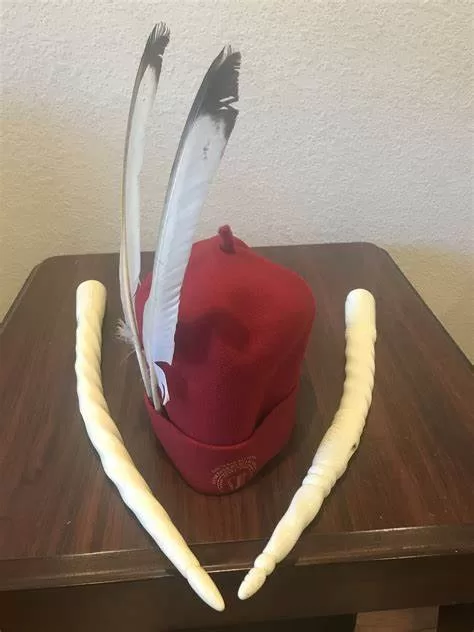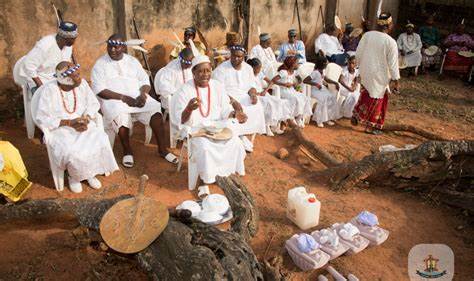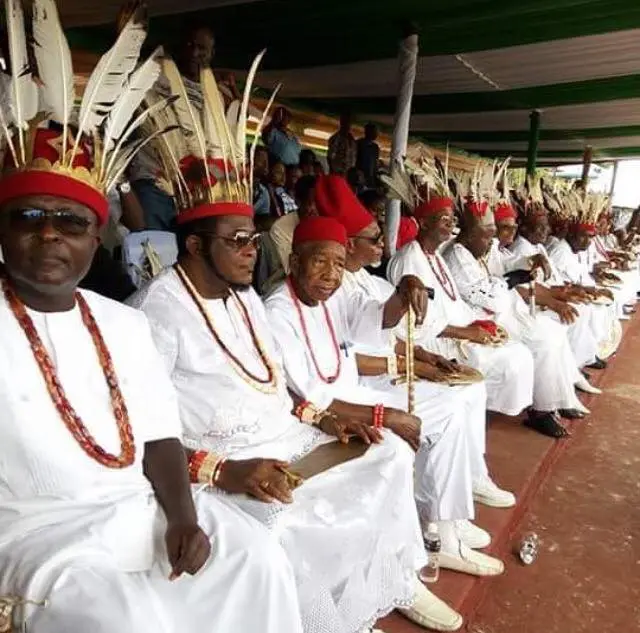Becoming an Ozo: A Symbol of Prominence and Prosperity in Igboland
Becoming an Ozo title holder is not a task taken lightly. It is expected that an individual aspiring to become an Ozo must be financially well-off. This belief has given rise to the Igbo saying, “Ichi ozo bu maka ndi ogadagidi,” which translates to “Taking the Ozo title is an affair for the high and mighty.”

Capturing the Essence: The Ozo Cap and Staffs
The aspiring Ozo titleholder must undergo several preliminary practices and seek approval from the head of all titled Ozos in his community. Once the intention to join is communicated, the Ozos inform other members of the group, who then provide feedback outlining the specific requirements the aspirant must fulfill before being accepted into the fold. In some communities like Abagana, for example, this may involve preparing sumptuous meals and drinks for the community on multiple occasions.
It is crucial to note that the Ozo title is a sacred affair regulated by traditional rules and customs. For instance, an individual cannot be titled an Ozo if their father is still alive and has not taken the title themselves. Additionally, being a convicted murderer or thief disqualifies one from attaining the Ozo title. Strangers, no matter their contributions to the community’s development, are also forbidden from holding the Ozo title.
To identify an Ozo titleholder, one can look for the distinct beads worn around their ankles and the ankles of their first wife, as well as the eagle feather adorning their red cap. These visual cues are unmistakable signs of their esteemed status within the community.
Common Misconceptions of the Ozo Society

Preserving Tradition: Ozo Title Taking Rites in Onitsha
Read Also:
Preserving the Ozo Society in Igbo land
Common Ozo Names in Igbo land
| Akubueziokwu |
| Akubuko |
| Akukalia |
| Akunne |
| Akunnia |
| Akunwafo |
| Akunwata |
| Akunwanne |
| Akupueome |
| Akurienne |
| Amalunwaeze |
| Belugo |
| Chibundo |
| Chinweozo |
| Chinyelugo |
| Chulawuebuka |
| Dakwasienyi |
| Egonwanne |
| Enyikwoku |
| Eselu Enuego |
| Eze Afulukwe |
| Ezennia |
| Ezenwata |
| Eze nyelu aku |
| Ibaku |
| Idei |
| Ifedioramma |
| Ifechukwu kwulu |
| Kpajie |
| Kwocha aka |
| Kwasie oku |
| Mmilililienyi |
| Nnabuenyi |
| Mnabunie |
| Nnanyelugo |
| Nwa amulunama |
| Nwabunie |
| Nwachinamelu |
| Nwaezeoku |
| Nwakaibie |
| Nwalie |
| Nwanonaku |
| Nwolili |
| Nwawulu |
| Odinigwe |
| Ogbu |
| Ojinaka |
| Okudilinwa |
| Okutalukwe |
| Onönaenyi |
| Ononaku |
| Onwa na etili ira |
| Orimili |
| Ozodioramma |
| Ozodinaobi |
| Ugochukuu |
| Ugokwesili |
| Ugonabo |
| Ugonwanne |
Post Disclaimer
The opinions, beliefs and viewpoints expressed by the author and forum participants on this website do not necessarily reflect the opinions, beliefs and viewpoints of Anaedo Online or official policies of the Anaedo Online.

